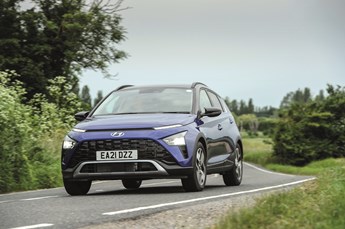We use cookies to ensure that we give you the best experience on our website. If you continue without changing your settings, we will assume that you are happy to receive all cookies on the Business Car website. However, if you would like to, you can change your cookies at any time

The start point for the best source of fleet information |
First drive: Hyundai Bayon
Date: 29 September 2021 | Author: Simon Harris

|
|
||||||||||||||||
Such has been the popularity of SUVs in recent years, and the higher level of growth in the compact sectors, some manufacturers believe their ranges can accommodate two similar cars.
Ford has the Ecosport and the Puma, both serving slightly different audiences. Vauxhall, too, has the Crossland and Mokka. Like Ford, the less expensive model is based on older vehicle architecture.
Hyundai has performed a similar trick with the new Bayon, except the roles are reversed when it comes to the platform underneath. The more expensive Kona shares components with the previous generation i20, while the Bayon draws on a new platform that made its debut with the i20 launched last year.
There is something of an overlap: both the Bayon and the Kona can be specified with a 120hp version of Hyundai's 1.0-litre three-cylinder petrol engine, which comes with 48V mild hybrid technology (rare for such a small car to have such a high energy mild hybrid system, as 12V is more the norm). The price premium for the Kona over the Bayon on a like-for-like basis is £600.
But the overlap is small, and most Kona customers are now choosing hybrid or electric versions. The Bayon, which is a similar size to the Kona, and looks related, if not an exact match, is petrol only.
The range kicks off with a 100hp version of the 1.0-litre turbocharged petrol engine, with the 120hp version at the top of the line-up.
Another advantage of the new platform is a clever new six-speed manual gearbox that features an electronically controlled clutch to decouple the transmission from the engine under certain driving conditions to enhance efficiency. It is also offered with a seven-speed dual clutch transmission as an option for those who prefer automatics.
The Bayon looks modern and perhaps not as deliberately unconventional as the Kona. Inside looks bang up to date too, and the car comes with a digital instrument display as standard. The entry-level SE Connect has an 8in dashboard touchscreen, but one step up to Premium replaces this with a 10.25in version.
It is perhaps a bit disappointing to see so many hard plastic surfaces on the dashboard and doors, but this type of material tends to be lighter than soft-touch alternatives. The Bayon's light weight must help contribute to its good fuel consumption. It is better on fuel than a petrol Kona, and its frugal nature seemed to be borne out on our mixed test route.
As this sector seems to be split into more affordable and more style-focused options (Ford Ecosport and Vauxhall Crossland are in the former camp while the Puma and Mokka are in the latter), the Bayon has a good opportunity to trump rivals on overall running costs, as well as on the strength of its five-year/unlimited mileage warranty.
Hyundai Bayon 1.0 T-GDI 100 SE Connect
P11D: £20,070
Residual value: 38.8%
Depreciation: £12,281
Fuel: £6,811
Service, maintenance and repair: £1,985
Cost per mile: 35.12p
Fuel consumption: 53.3mpg
CO2 (BIK %): 120g/km (28%)
BIK 20/40% a month: £94/£187
Luggage capacity: 321 litres
Engine size/power: 998cc/100hp
Verdict |
8/10 |
|||
 |
|
 |
|
|











